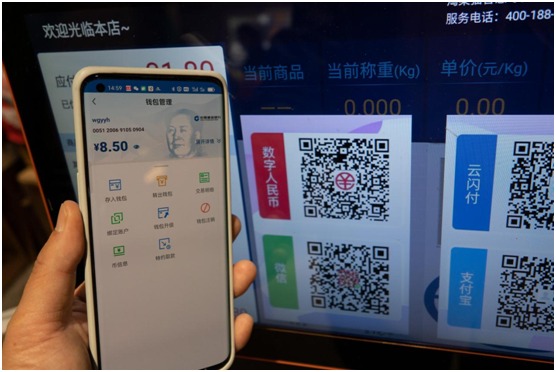By Peng Xunwen, People’s Daily Overseas Edition
A Chinese senior citizen surnamed Liu was recently surprised by the convenience of digital RMB, or e-CNY, during a visit to Bo’ao, south China’s Hainan province.
He told People’s Daily that he bumped into a digital RMB promotional activity in the city that was piloting e-currency, and finished payment by simply placing his smart watch on a POS machine.
“This ‘wallet’ came in very handy,” Liu said. He hoped that the new payment method could be applied in China as soon as possible.
A Shanghai resident surnamed Chen, who’s an owner of a vegetable stall at a farm produce market, holds similar points with Liu. “Thanks to digital currency, my daily turnover is automatically saved in my bank account. Besides, it also offers real-time and free transfer of money,” she said.
Digital RMB is essentially a legal currency issued by the People’s Bank of China (PBOC), the central bank of China, under national credit guarantee. It is digital cash, and completely equivalent to banknotes and coins in terms of value.
At the end of 2019, digital RMB was put in pilot tests in Chinese cities like Shenzhen, Suzhou and Chengdu, Xiong’an New area, a state-level new area in north China’s Hebei province, as well as future scenarios for the Beijing 2022 Olympic and Paralympic Winter Games.
By October 2020, six more pilot areas were added, including Hainan province, Shanghai, Changsha, Xi’an, Qingdao, and Dalian.
Experts pointed out that digital RMB has attracted wide attention for its convenience and efficiency. It transfers money in real time as there’s no intermediary agency between the payers and payees. Besides, it also works like cash in offline scenarios.
More importantly, digital RMB can better protect the privacy of users as it promises controllable anonymity and denies merchants and third-party platforms the access to consumers’ ID information and payment data.
As a key feature of e-CNY, controllable anonymity not only helps guarantee individuals’ legitimate anonymous transactions and personal information security, but also contributes to preventing, controlling and cracking down on money laundering, terrorist financing, tax evasion and other illegal and criminal activities for higher level of financial safety, said Mu Changchun, head of the Institute of Digital Money under the PBOC.
With multiple banks in the pilot areas testing the innovative payment method, e-CNY has been applied in a variety of scenarios ranging from catering services and daily payment to shopping and transportation.
It is expected that digital RMB will extend to online businesses like e-commerce and short video platforms, and play a major role in real economy sectors such as corporate trade and supply chain finance.
In the era of digital economy, digital currency boasts huge potential for development, and can help improve the efficiency of economic operation and may even give birth to new business forms and economic models, said Mei Xinyu, a researcher with the Chinese Academy of International Trade and Economic Cooperation under the Ministry of Commerce.
China enjoys many advantages in pushing forward with digital currency, Mei noted, explaining that the country has developed relatively complete infrastructure and payment systems, and electronic payment enjoys high acceptance among Chinese consumers and merchants.
Mei also believes that digital currency will make cross-border settlement more efficient as the COVID-19 epidemic prompts consumers across the world to develop a habit of online shopping and payment.
During the Boao Forum for Asia Annual Conference 2021, Li Bo, deputy governor of the PBOC, made it clear that the PBOC would focus on the following aspects in its work related to digital RMB, including advancing pilot projects and expanding their scope, further improving the infrastructure of digital RMB and enhancing the security and reliability of relevant systems, and formulating relevant legal and regulatory frameworks.
When asked whether digital currency would replace banknotes and general electronic payment as it gradually becomes mainstreamed, Mu stressed that the issuance of digital RMB is not based on administrative enforcement, but market-oriented, which signifies that paper money, electronic payment, and digital RMB will coexist in the foreseeable future.

Leave a Reply